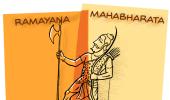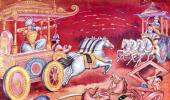Amongst the many characters in the Mahabharata, the impetuous Ashwathama comes across as a warrior lacking maturity and forethought. He often finds himself in difficult situations as he jumps headlong without assessing his capacity and strength.
A fascinating excerpt from Uday Shankar's Untold Tales From The Mahabharata
Illustrations: Uttam Ghosh/Rediff.com.
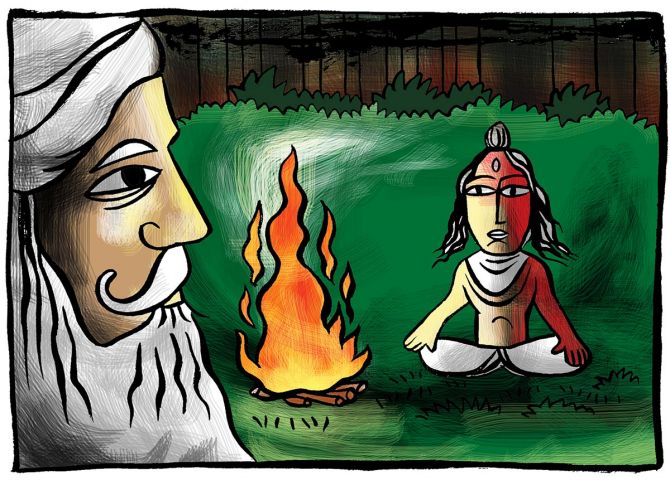
Once upon a time, a poor Brahmin couple is blessed with a child, and much to their shock, he comes into the world neighing like a horse! The boy, named Ashwathama, is the only child of Dronacharya and Kripi, the twin sister of Kripacharya.
Dronacharya is a great Shiva bhakt and had prayed to the god for a long time before Ashwathama was born.
The neighing sound, which resonated across the four corners of the earth, was accompanied by a celestial voice that proclaimed, ‘This is no ordinary child! He has been born with the blessings of Lord Shiva. He shall be named Ashwathama.’
And truly, the little boy is certainly not like every ordinary baby; he is born with a mani (precious stone) on his forehead, which is meant to protect him from demons and spirits.
* * *
Among all his pupils, Dronacharya is highly impressed by Arjun’s potential and promises to make him the sarvashresth dhanurdhari (greatest archer).
Dronacharya also gives Arjun the knowledge of invoking and using the Brahmastra (a celestial weapon capable of complete annihilation of the world) and teaches him the secret of launching and recalling the dreaded weapon.
But Arjun isn’t the only one who he imparts this knowledge to.
One day, Dronacharya calls Ashwathama for a private discussion. Both father and son sit before a sacred fire. Though he knows that his son is impetuous, his filial affection overrides everything else and he begins to teach his son the secrets of Brahmastra.
‘Son, pay careful attention to what I am going to tell you now. Today, I am going to introduce you to the deadly Brahmastra.
‘Listen well to what I say. This is not some toy that can be used whenever you like. It is so powerful that it can burn down the universe and bring about great devastation. It can end civilisation as we know it. It should not be used to settle scores, or even to protect your life. Unless there is a valid reason, the astra should not be invoked.
‘I know that you have a terrible temper. You are very emotional and have no sense of balance. I repeat, Ashwathama. Think a hundred times before using this destructive weapon.’
After the ritual, the Brahmastra enters Ashwathama from the fire and becomes a part of his arsenal. With the Brahmastra in his possession, Ashwathama’s ego gets a mighty boost.
Amongst the many characters in the Mahabharata, the impetuous Ashwathama comes across as a warrior lacking maturity and forethought. He often finds himself in difficult situations as he jumps headlong without assessing his capacity and strength.
Known to punch above his weight, he relegates the mighty Brahmastra to just another arrow in his quiver.
His ego is such that he believes he can even get hold of the Sudarshan Chakra, which is next on his list of weapons to acquire. His belief in his ability and the arrogance that defines him compels him to think that for a warrior of his stature, the Sudarshan Chakra should ideally be with him and not with Krishna.
To fulfil his desire, he travels to Dwarka and meets Krishna. He thinks that by acquiring the chakra, he can be mightier than Krishna himself.
‘O Krishna, I have every astra (weapon) one can dream of -- the greatest of them being the Brahmastra. With this impressive collection of weapons, it is a foregone conclusion that I have no competition today. Nobody can defeat me. Yet, I am not satisfied and wish to trade my Brahmastra for your Sudarshan Chakra. Can you give it to me?’
‘By all means, Ashwathama,’ replies Krishna, adding. ‘Though you should know that the Sudarshan Chakra is no ordinary disc. Can you manage?’
Brimming with overconfidence, Ashwathama laughs derisively and tells Krishna that there is no weapon that he is incapable of handling. Krishna summons his chakra.
‘O Sudarshan, Ashwathama desires to possess you. From now on, you can be a part of his arsenal.’
With these words, Krishna releases his chakra. As the flaming disc approaches Ashwathama, he finds it too hot to handle and in the process, his fingers get burnt.
‘Please get this thing away from me!’ screams Ashwathama fearfully even as Krishna tries to suppress a smile.
Ashwathama, in all his arrogance, is not aware of the fact that the Sudarshan Chakra belongs to Lord Vishnu; it is the very same celestial disc which, when summoned, appears on Krishna’s index finger to protect dharma which is on the decline in Dwaparyug.
* * *
On the eighteenth day of the Kurukshetra battle, the Kauravas are a spent force. Defeat looms large with the death of Dronacharya, the last recognised strongman in the Kuru ranks.
The invincible Bhishma who can choose the timing of his death had fallen to Arjun’s arrow on seeing Shikhandi, who is none other than Amba in her previous birth, who had vowed to kill Bhishma. Resting on a bed of arrows, Bhishma waits for the auspicious time to leave the body and go back to the heavens.
Karna too is no more.
The warriors still in the fray are Duryodhan, Kripacharya, Ashwathama and Kritavarma. Kritavarma, a Yadava warrior, fights for the Kauravas as Krishna gives away his army -- the Narayani Sena -- to Duryodhan as per the latter’s request.
Duryodhan knows that the end is near and hides in the Dwaipayan lake.
At nightfall, Ashwathama, Kripacharya and Kritavarma search for Duryodhan and call out to him. Then they hear a voice from inside the lake and they know that it is Duryodhan.
The trio is unaware that they are being watched by hunters hidden behind the trees. These hunters move stealthily and run to the Pandavas in the dead of the night. They meet both Yudhishtir and Bhim and tell them about the lake where Duryodhan is hiding.
the Pandavas reach the lake and ask Duryodhan to come out of hiding but they are met with silence. They continue their barbs till Duryodhan can’t take it any longer. He comes out and agrees to fight Bhim.
In the course of the fight, Bhim strikes Duryodhan on the thigh and the Kuru prince falls to the ground. As he is left to bleed and die, Ashwathama consoles him.
‘O Duryodhan, the Pandavas have defeated us through treachery and guile. I promise you that before you die, I will slay the Pandavas and bring their heads to you.’
The mortally wounded Duryodhan looks at his friend.
‘Ashwathama, nobody could touch the Pandavas during the war. If you can kill them all, you would have done what none could do thus far.’
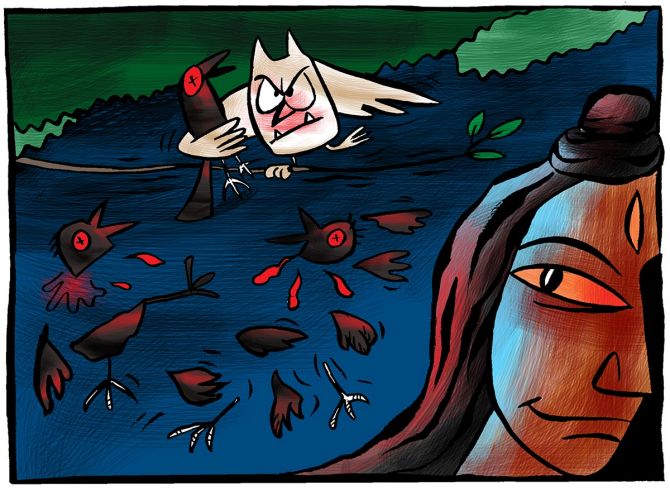
As darkness falls, Ashwathama, his maternal uncle Kripacharya and Kritavarma ride towards the Pandava camp, which is in a celebratory mood. They dismount and decide to wait for some time.
Meanwhile, Ashwathama looks at the trees and spots a number of nests occupied by crows, which are being watched by an owl. The same crows that had harassed the owl during the day become sitting ducks.
With its excellent night vision, the owl swoops down on the nests and starts killing the crows in the most gruesome fashion. The killing spree continues unabated throughout the night till no crow is left alive. After some time, all that is left is torn feathers, severed necks and dismembered plumages of the ravens.
Ashwathama’s eyes light up and he thinks to himself, ‘This is what I am going to do, as a sleeping enemy offers no resistance. I will stealthily slip into the Pandava camp and finish off not just the Pandavas, but everyone who dares to come in my way.
‘There is no dharma or adharma; all is fair in love and war. When I complete the task, I will give Duryodhan the good news so that he can die peacefully.’
When Kripacharya comes to know of his diabolical plan, he advises Ashwathama to respect the rules of warfare.
‘In war, never slay a sleeping adversary. This is not dharma. You can defeat him in combat fought fairly and not otherwise.’
‘Did the Pandavas follow dharma when they killed grandsire Bhishma? What rules did they follow when they killed my father or even Karna, for that matter?’ Through his cogent arguments, Ashwathama convinces Kripacharya and Kritavarma to join him in the covert operation.
The trio reach close to the Pandava camp, and Ashwathama instructs Kripacharya and Kritavarma to wait outside.
Away from the camp, the Pandavas are celebrating their victory. The mood is one of exhilaration as people dance and sing with gay abandon.
For Ashwathama, the moment of reckoning has arrived. He enters the tent and finds Drushtadumnya in deep slumber. He kicks his father’s assassin and wakes him up. He uses his fists and beats him to a pulp. Like a savage, he strangles Drushtadumnya to death.
As he searches for the Pandavas, he is disappointed as he doesn’t find them. Instead, he finds the five young sons of the Pandavas. Like an animal, Ashwathama pounces on the innocent boys whose life had just begun and decapitates their heads one by one.
Not stopping at that foul murders, the unrepentant Ashwathama turns into a killing machine by slaying Shikhandi and several other prominent warriors from the Pandava camp, such as Yudhamanyu and Uttamaujas (Arjun’s bodyguard).
The commotion draws soldiers from nearby who try to attack Ashwathama but to no avail.
Those who escape his murderous attack are set upon and hacked to death by Kripacharya and Kritavarma who are hiding outside.
When the grisly raid comes to an end, a possessed Ashwathama is soaked from head to foot in the blood of his victims. It is difficult to comprehend that the son of a teacher would resort to such barbarity.
The raiders leave the camp and arrive just in time to see Duryodhan take his last few breaths. Ashwathama tells Duryodhan that he has practically wiped out the Pandava line of succession by killing the sons of the Pandavas.
A satisfied Duryodhan closes his eyes, never to open them again.
The next morning, the Pandavas and Krishna, who were away the previous night, return to their camp. They are shocked to see the grisly scene that greets them.
Yudhishtir faints on seeing the bodies of the five young boys whose lives have been nipped in the bud. There is blood everywhere and the faces are unrecognisable. Ashwathama’s vengeance has left a trail of death and destruction.
Bhim is boiling with rage. The Pandavas know that out of the surviving Kauravas, Ashwathama is the only warrior left in the field powerful enough to be so brutal. Arjun vows to track down the culprit.
The five brothers start searching for Ashwathama. Meanwhile, the warrior in question comes to know that he is being pursued and runs away. The Pandavas search for him and finally locate him near Sage Vyasa’s ashram on the banks of the Ganga.
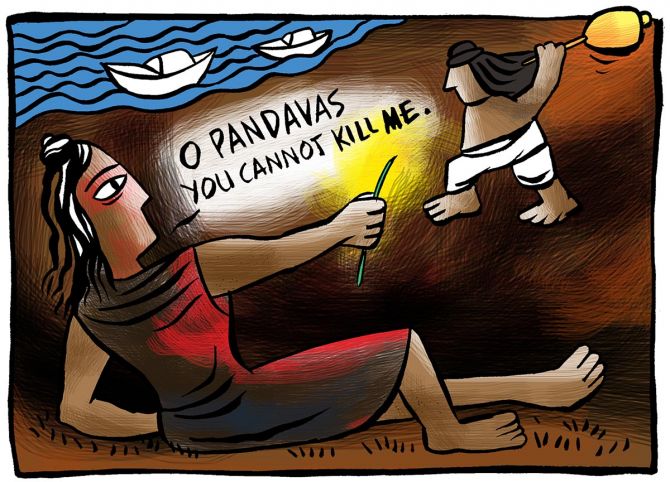
Ashwathama is cornered and faces the wrath of the five brothers. Krishna too arrives on the scene. His mace raised, Bhim approaches Ashwathama and is all set to strike him.
Ashwathama is not done as yet.
‘O Pandavas. You cannot kill me even if you want to as I hold the ace. Be prepared to die.’
He picks up a blade of dry grass, chants a mantra and invokes the Brahmastra, disregarding the advice given by his late father Dronacharya. Krishna asks Arjun to release his Brahmastra as a counter to Ashwathama’s weapon.
As the two powerful astras are about to collide, Sage Vyasa intervenes and stops the weapons with his divine power. He asks both Arjun and Ashwathama to recall their weapons.
Arjun obeys Vyasa but Ashwathama does not know how to recall the astra.
Vyasa instructs Ashwathama to direct it elsewhere.
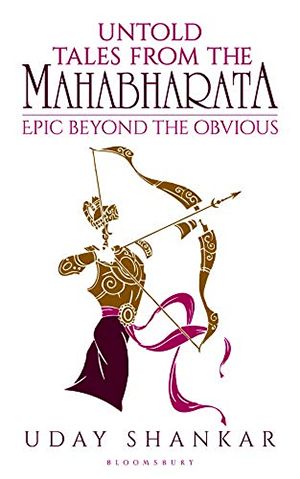 Continuing with his pathological hatred towards the Pandavas, Ashwathama screams aloud, ‘So what if I couldn’t finish off the Pandavas. Now let me make amends by killing their heirs and finish their legacy once and for all.’
Continuing with his pathological hatred towards the Pandavas, Ashwathama screams aloud, ‘So what if I couldn’t finish off the Pandavas. Now let me make amends by killing their heirs and finish their legacy once and for all.’
With these words, he directs the weapon towards the womb of the pregnant Uttara (Abhimanyu’s wife) in an attempt to kill Parikshit and end the lineage of the Pandavas.
The trajectory of the Brahmastra thus changes course and heads towards Uttara and her unborn child.
Krishna summons the Sudarshan Chakra to stop Ashwathama’s weapon. The chakra positions itself over Uttara’s womb. The Brahmastra tries to pierce the ring of protection and is ultimately consumed by the Sudarshan Chakra.
Uttara’s child is saved and the heir Parikshit is all set to take birth and continue the legacy of the Pandavas.
The angered Pandavas want to cut Ashwathama to pieces but Sage Vyasa stops them from doing so.
Krishna asks Bhim to pull the mani out of Ashwathama’s head. With his brute strength, Bhim wrenches it out of his head leaving Ashwathama bleeding.
For once, anger gets the better of Krishna.
‘Never have I seen someone so inhuman and heartless as you! You didn’t think twice before killing five innocent boys barely in their teens. You didn’t even spare an unborn child.
‘For your misdeeds, you will be afflicted with leprosy that will eat your skin. People will run away at the very sight of you. Your body will be covered with cuts and wounds from where blood and puss will flow uncontrollably.
‘Nobody will help you or provide you with food and shelter.
‘You will roam like a mendicant from place to place without rest or respite; even death cannot save as you will continue to live forever.’
It is believed that Ashwathama still roams the earth, as punishment for his sins and with no way to repent for them.
This edited excerpt from Untold Tales From The Mahabharata: The Epic Beyond The Obvious by Uday Shankar, has been used with the kind permission of the publishers, Bloomsbury India.
